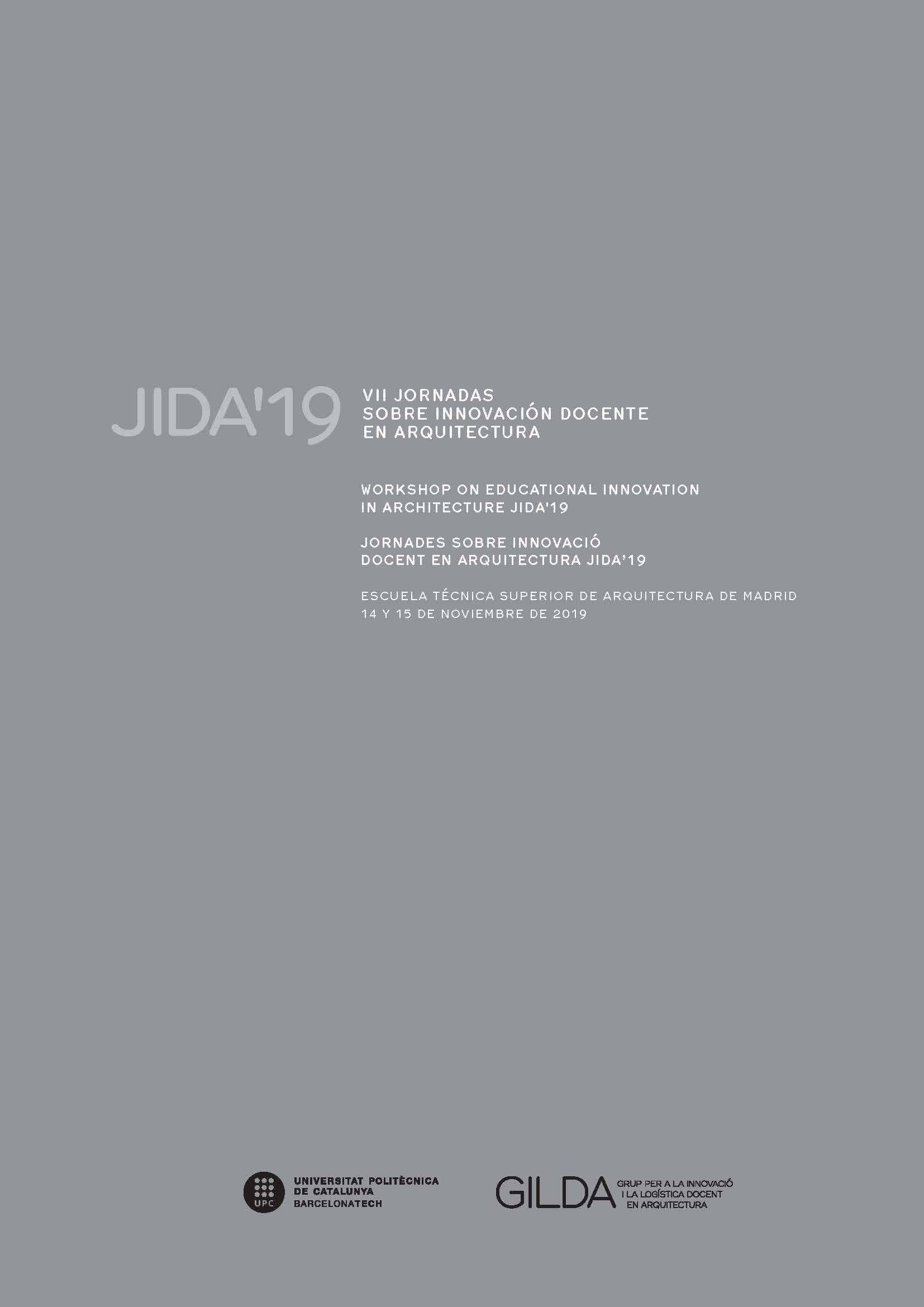UNI-Health, Programa Europeo de Innovación Educativa para la Salud Urbana
DOI:
https://doi.org/10.5821/jida.2019.8406Resumen
UNI-Health (2019) es un Programa Europeo de Innovación Educativa para la Salud Urbana dentro de la red EITHealth. El programa establece las recomendaciones de diseño para el espacio público desde la perspectiva de la salud. El principal objetivo es formar a profesionales, investigadores y diseñadores de distintas disciplinas. Este proyecto innova en la creación de sinergias entre universidades, investigadores, ciudadanía, empresas y administraciones locales, trabajando conjuntamente en el reto de las ciudades amigables con las personas mayores. El resultado es una metodología de diagnosis urbana para identificar los principales retos de los barrios y definir medidas que permitan la mejora de los entornos urbanos a través de ordenanzas y proyectos de diseño urbano. Este enfoque multidisciplinar resulta en una mayor concienciación sobre el impacto del entorno urbano en la salud y en proyectos más inclusivos que promuevan el envejecimiento activo.
Citas
AZNAR, P., MARTÃNEZ-AGUT, M.P., PALACIOS, B., PIÑERO, A., y ULL, M. A. (2010). “Introducing sustainability into university curricula: an analysis of teachers’ preconceptions at University of Valenciaâ€. EnvironmentalEducationResearch.
BAMBÓ NAYA R., DE LA CAL NICOLÃS, P., GARCÃA-PÉREZ, S. y MONCLÚS J. (2018). “Cuatro años de talleres de regeneración urbana: el aula proyectada en la ciudadâ€. En Textos de Arquitectura, Docencia e Innovación. JIDA 5. p. 244-261.<http://hdl.handle.net/2117/126454>
CITYLAB PROJECT <https://www.uantwerpen.be/en/projects/citylab-la--engaging/citylab-project/>
COMISIÓN EUROPEA. (2019). GuÃa del programa Erasmus+. <https://ec.europa.eu/programmes/erasmus-plus/resources/programme-guide_es>
DAHLGREN, G. y WHITEHEAD, M. (1991). “Policies and strategies to promote social equity in healthâ€enBackground document to WHO-Strategy paper for Europe. Arbetsrapport 2007:14. InstituteforFutureStudies: 2007:14.
ESARQ-UIC ESCUELA SUPERIOR DE ARQUITECTURA DE LA UNIVERSIDAD INTERNACIONAL DE CATALUÑA. (2011). Postgrado en Accesibilidad y Diseño para Todos. <http://www.uic.es/es/estudis-uic/architecture/postgrado-arquitectura-accesible-dise%C3%B1o-todos-online> [Consulta: 22 de agosto 2019]
FIDALGO, A. (2007). “Trabajo en equipo. Caja negra versus Caja blanca†en Innovación Educativa. Conceptos, recursos y reflexión sobre innovación educativa, 25 de abril. <https://innovacioneducativa.wordpress.com/2007/04/25/trabajo-en-equipo-caja-negra-versus-caja-blanca/> [Consulta: 20 de agosto 2019]
GEHL, J. (2010). Cities for people. Washington DC,Island Press.
HIGUERAS, E., ROMÃN E. y EIROA, T. (2012). “La rehabilitación urbana integral desde los talleres universitariosâ€. Foro Green Cities & Sostenibilidad. <http://aulagreencities.coamalaga.es/la-rehabilitacion-urbana-integral-desde-los-talleres-universitarios/>
HUDU. (2007). Delivering Healthier Communities in London.Londres: Land Use Consultants in association with the Centre for Research into Environment and Health.
MUGARRA ELORRIAGA, A. et al. (2017). “Ciudades amigables para todas las personas: Aprendizaje y Servicio Solidario para proyectos innovadores e inclusivos†en Deusto Social Impact Briefings, No. 2.
PASCUAL SENMARTI, X. (2019). “Aprendizaje basado en retos/ABP/ABp/AVEv†en Informe Odite sobre tendencias educativas. No.2. Barcelona. p. 16-19. <http://odite.ciberespiral.org/comunidad/ODITE/recurso/informe-odite-sobre-tendencias-educativas-2019/2d28a53f-bfcd-432f-9831-5d9a177eaf14>
ROCA, E., AQUILUÉ, A. y GOMES R. (2017). “Caminar la ciudad: Barcelona como experiencia de innovación docente†en Textos de Arquitectura, Docencia e Innovación. JIDA 4. p.194-207.<http://hdl.handle.net/2117/106889 >
SAVERY, J. (2006).â€Overview of Problem-based Learning: Definitions and Distinctions†en Interdisciplinary Journal of Problem-Based Learning, 1(1). <https://doi.org/10.7771/1541-5015.1002>
SCOTT, C.L. (2015). “El futuro del aprendizaje 3. ¿Qué tipo de pedagogÃas se necesitan para el siglo XXI?†en Investigación y prospectiva en educación. UNESCO, ParÃs. Documentos de Trabajo ERF, No.15. <https://unesdoc.unesco.org/ark:/48223/pf0000243126_spa>
UN. (2015). “Agenda 2030 sobre el Desarrollo Sostenibleâ€. <https://www.un.org/sustainabledevelopment/es/>
WHO. (2007). “Global Age-friendly Cities: A Guideâ€.<https://apps.who.int/iris/handle/10665/43755>






















